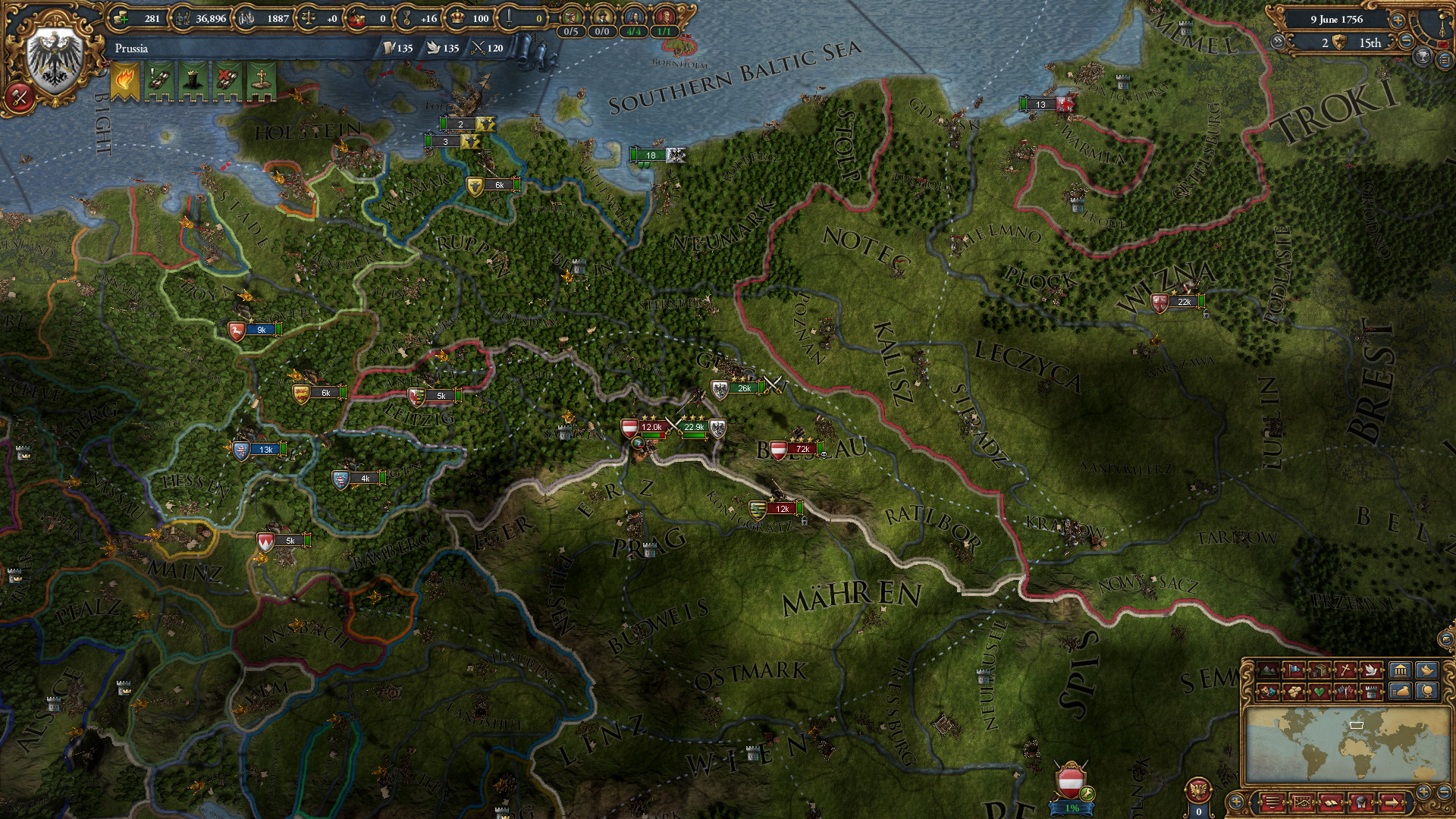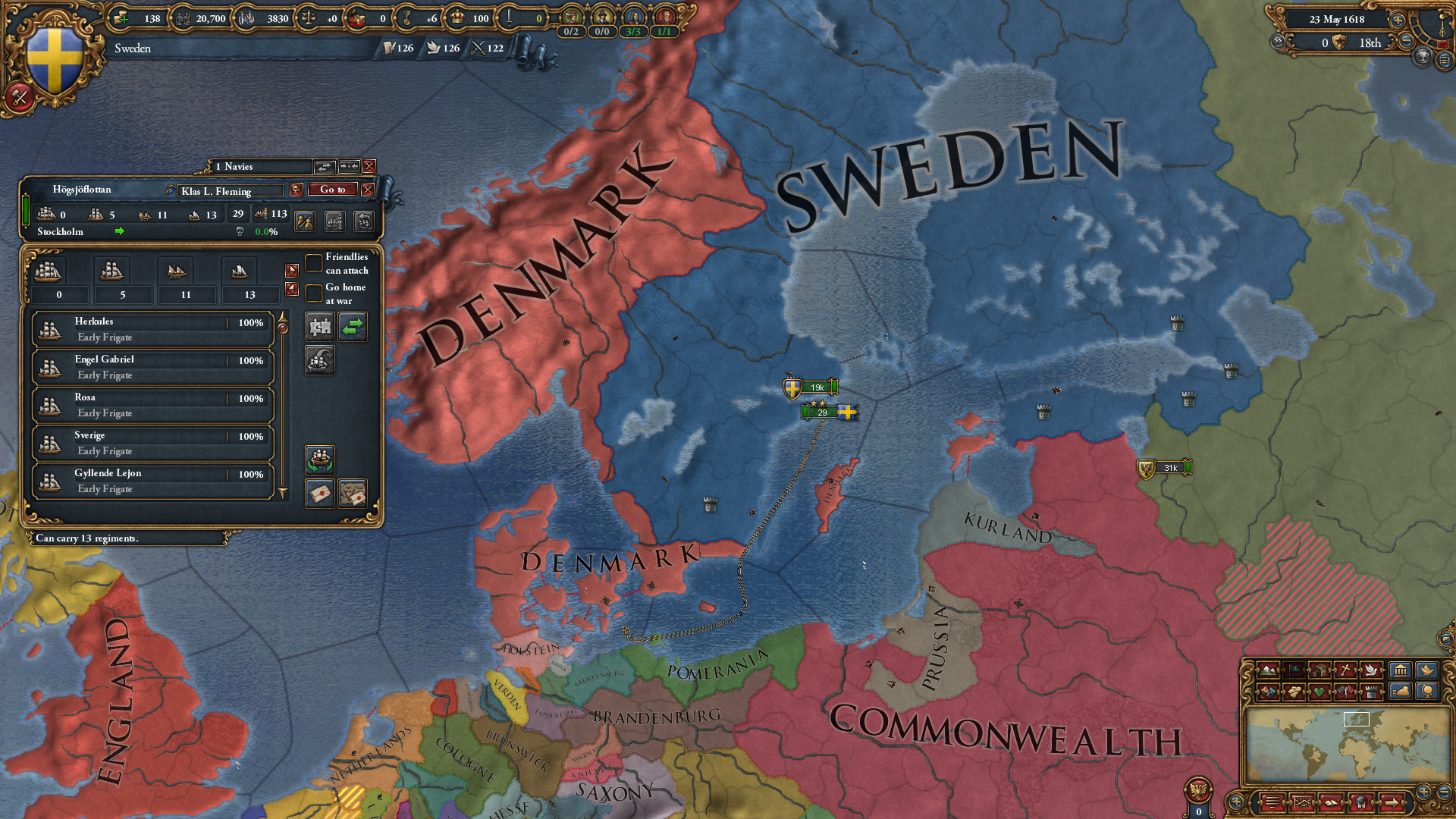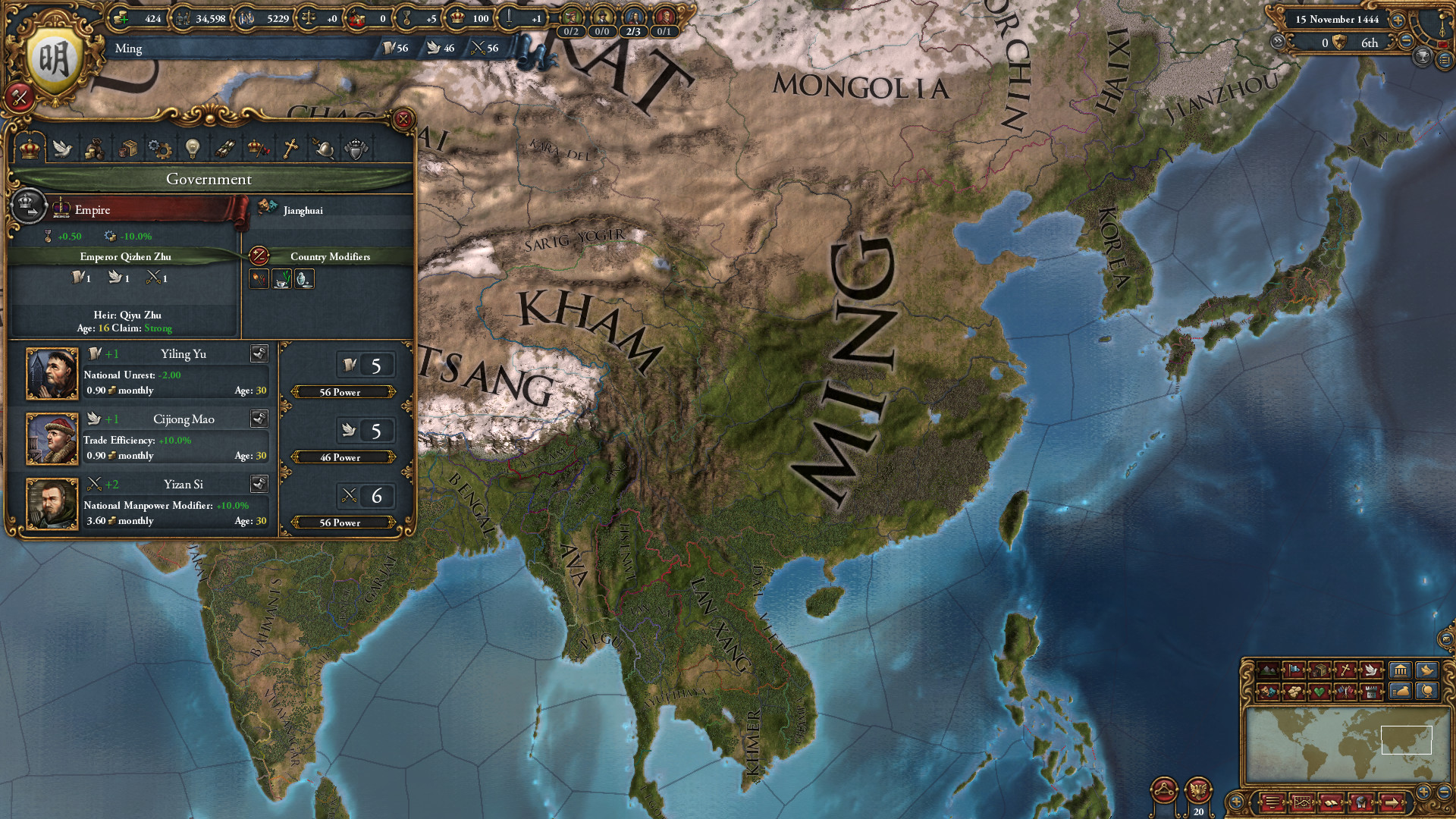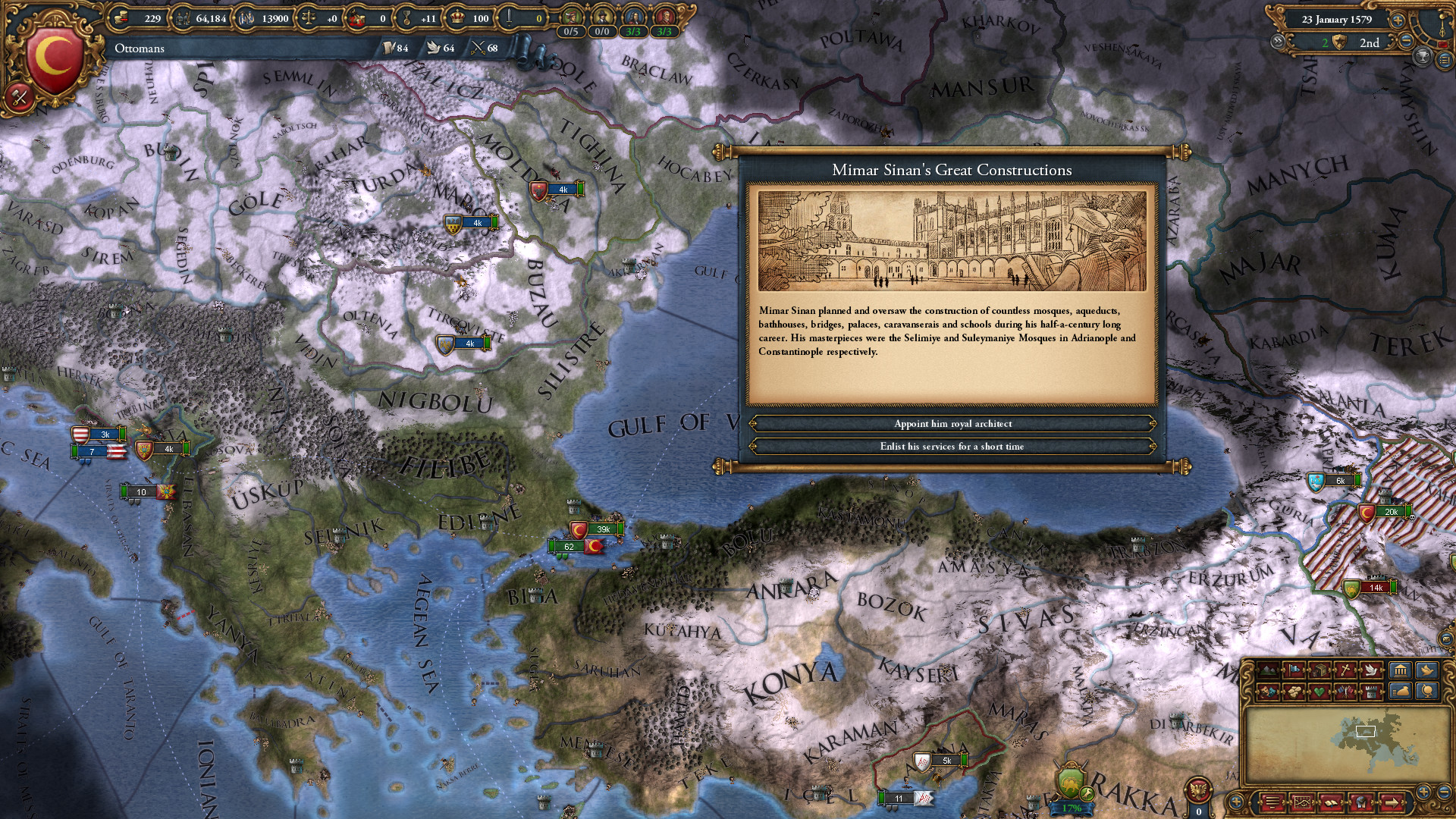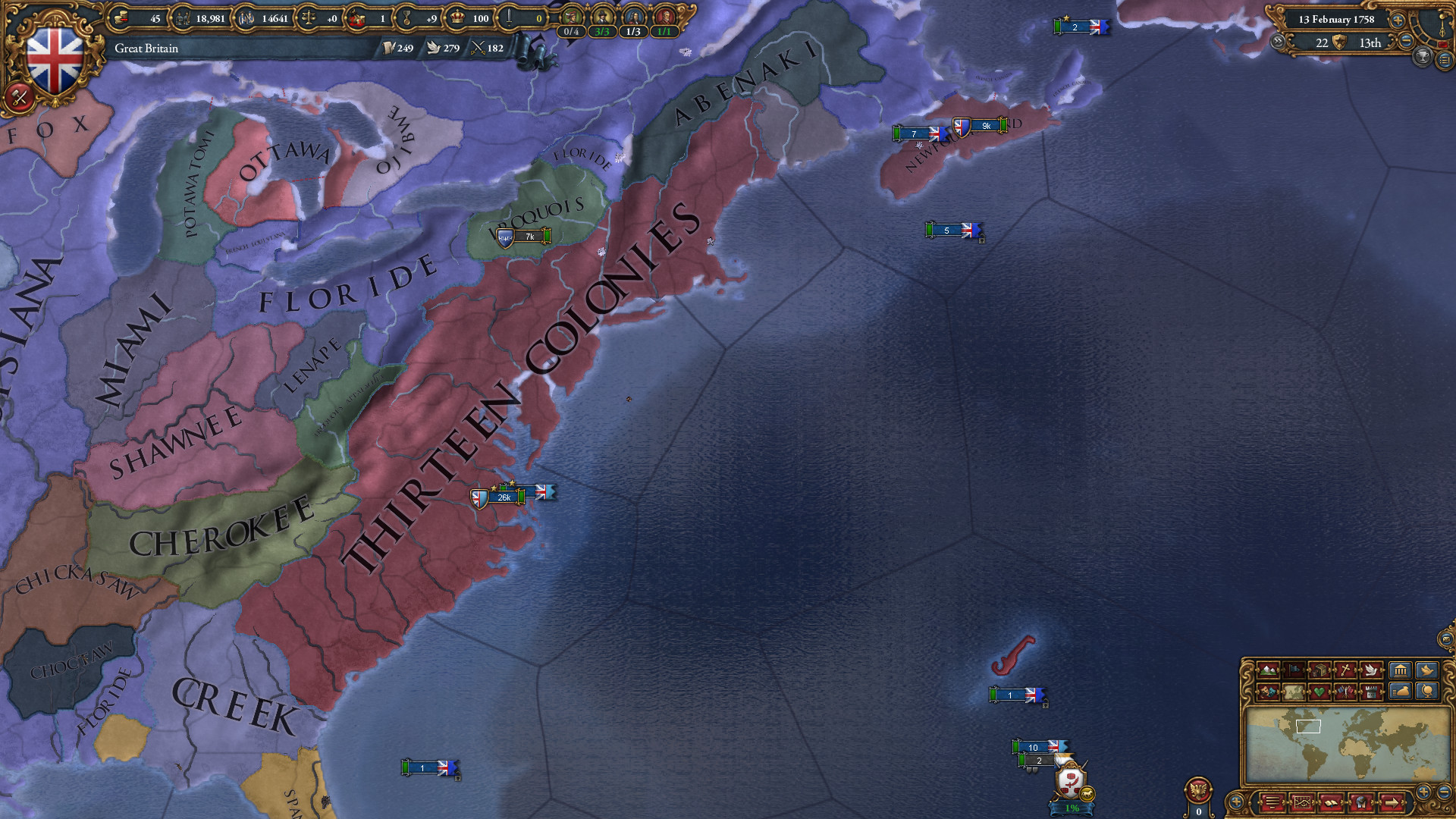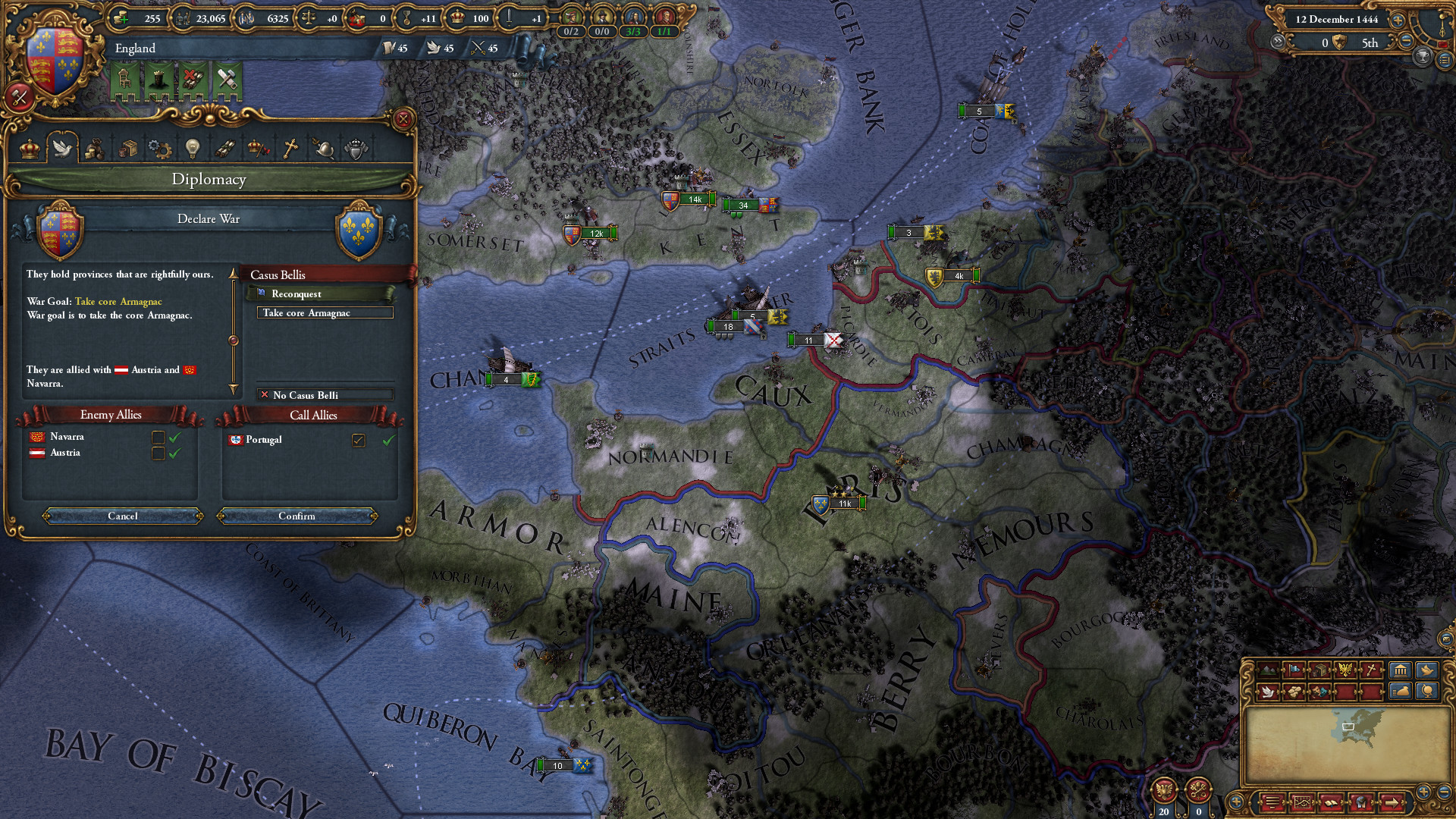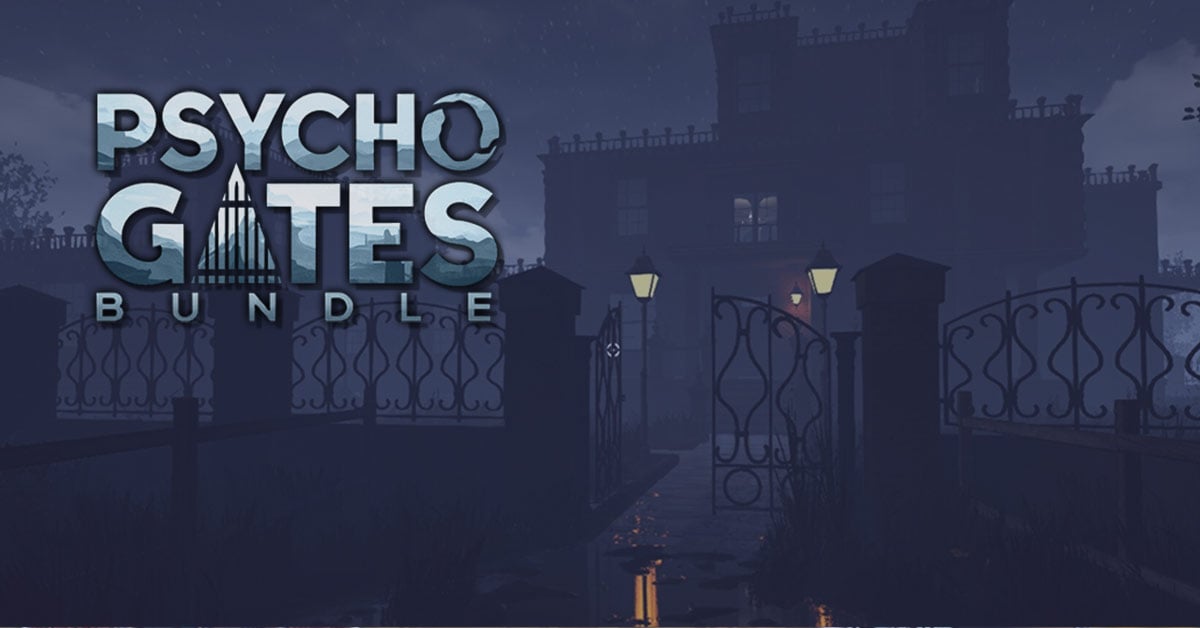Fulfill Your Quest For Global Domination
Paradox Development Studio is back with the fourth installment of the award-winning Europa Universalis series. The empire building game Europa Universalis IV gives you control of a nation to guide through the years in order to create a dominant global empire. Rule your nation through the centuries, with unparalleled freedom, depth and historical accuracy. True exploration, trade, warfare and diplomacy will be brought to life in this epic title rife with rich strategic and tactical depth.
Paradox Development Studio is back with the fourth installment of the award-winning Europa Universalis series. The empire building game Europa Universalis IV gives you control of a nation to guide through the years in order to create a dominant global empire. Rule your nation through the centuries, with unparalleled freedom, depth and historical accuracy. True exploration, trade, warfare and diplomacy will be brought to life in this epic title rife with rich strategic and tactical depth.
Main Features
- Make your own decisions: Nation building is completely flexible and the possibilities are endless.
- Use your Monarch Power: Experience the new system of monarch power where your choices are influenced by the caliber of the man or woman you have at the top and will direct the ebb and flow of gameplay.
- Experience history coming to life: The great personalities of the past are on hand to support you as you make your mark on thousands of historical events.
- Turn the world into your playground: Enjoy hundreds of years of gameplay in a lush topographical map complete with dynamic seasonal effects.
- Experience the all new trade system: The trade system adds a new dimension to the great trade empires of the period. Gain control of vital trade routes and make the wealth of the world flow to your coffers.
- Bring out your negotiating skills in a deeper diplomatic system: Use coalitions, royal marriages and support for rebels and explore the possibilities of the new unilateral opinion system.
- Engage in Cross-platform Multiplayer: Battle against your friends or try the co-operative multiplayer mode that allows several players to work together to control a single nation with up to 32 players. Featuring improved chat and new matchmaking servers.
- Create your own history & customize your game: Europa Universalis IV gives you the chance to customize and mod practically anything your heart may desire and uses Steam Workshop.
The Teutonic Order
Speaking of the free patch: I know that there are people who do not care too much about the content of the Immersion Pack. Because of that, the end of every Mission Tree Dev Diary will also have a section addressing free content or balance changes concerning countries outside of the DLCs scopes for Patch 1.34.
With that being said, lets get started with the content reveal! But first, as usual, take into account that this content is currently under development and unpolished, so there will be placeholder art, typos, tweaked numbers, etc. before the release version.
Where some states have an army, the Prussian Army has a state. - Voltaire
Prussia was hatched from a cannon-ball. - Napoleon Bonaparte
I promise the chastity of my body, and poverty, and obedience to God, Holy Mary, and you, to the Master of the Teutonic Order, and your successors, according to the rules and practices of the Order, obedience unto death. - Oath sworn upon admission into the Teutonic Order
As you can guess, the first dev diary is about our favorite space marine nation, the Teutonic Order, and to some extent, Prussia.
Requested by Duke Conrad of Mazovia in 1225, the Teutonic Order conquered the land of the Old Prussians, converting them to Christianity while the Prussian lands got Germanized over the two centuries. As the Teutonic Order was eventually conquered and vassalized by the Poles, secularized into Prussia and inherited by the Hohenzollern, the mission tree of the Order is less about recreating history and more about the what if.
And the many question marks of their mission tree show it:
The Teutonic Mission Tree has only 6 missions you can do from the get-go, which handle the very basics of the Orders needs: gain protection from Poland, ally (and vassalize) the Livonian Order, build to force limit and of course handle the Prussian Confederation - which has become its own little disaster: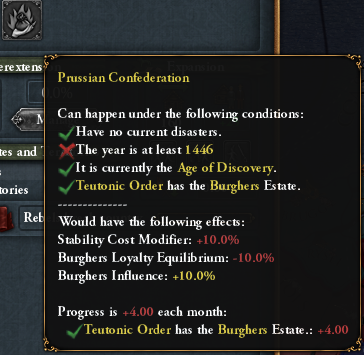
Note: the way it works is still the same as it is right now in EU4. Just the first event which gives your burghers a ton of land has been moved from a random event into one triggered by the disaster. Without the DLC you will have a decision to end the disaster, while with it the mission Handle the Confederation will finish it.
The mission Seek Imperial Protection is about joining the HRE. As you are surrounded by Poland and Lithuania, it is only natural that you want to find a way to protect yourself from these two.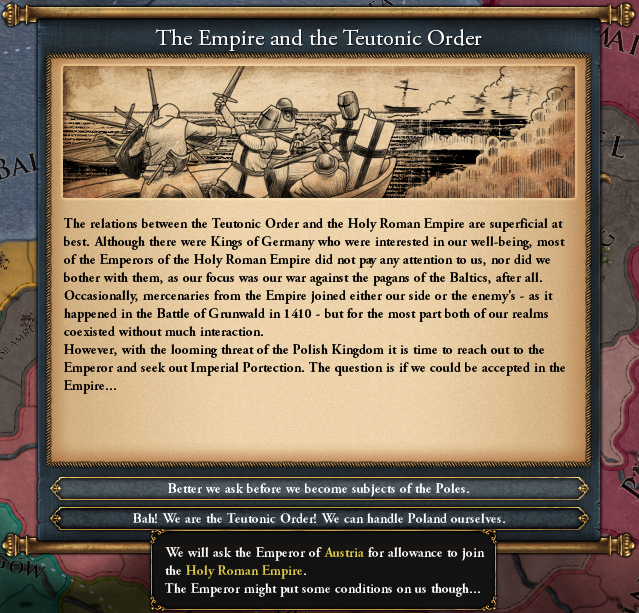
The Emperor will of course receive the corresponding event to it too.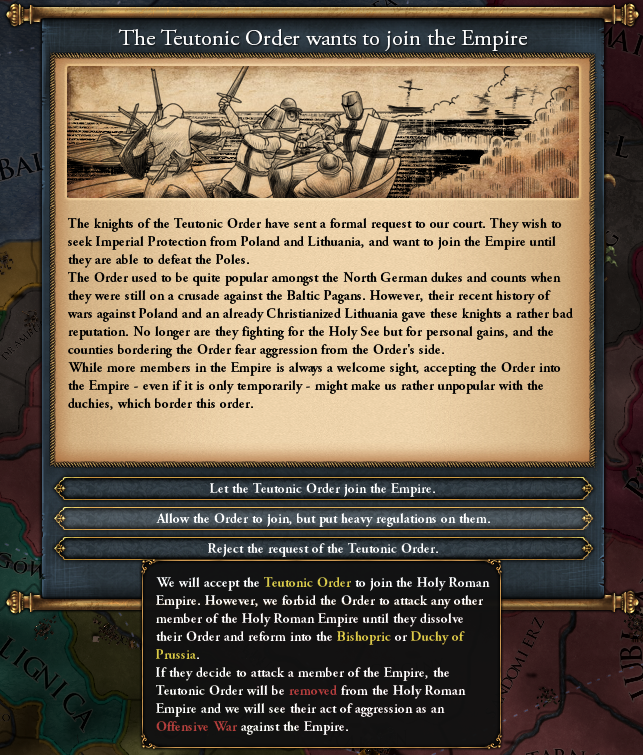
Note: The Emperor will receive this event if you join the HRE through the HRE menu instead of the event - and they can kick you out if you are on the Emperors bad side.
The Emperor will most likely choose to accept the Order in the Empire - but under the heavy restrictions that internal wars within the Empire are forbidden. Of course you can choose to reject this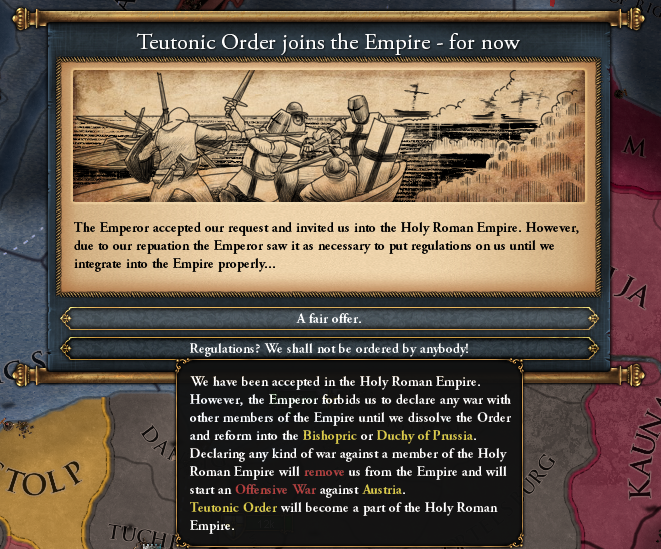
A lot of guides will probably have to be rewritten now as the HRE is no longer a viable expansion path in the early game.
The mission Defeat Poland, which can be finished by either conquering 4 provinces of Poland or by defeating 3 Polish armies in battle, will unlock the rest of your mission tree.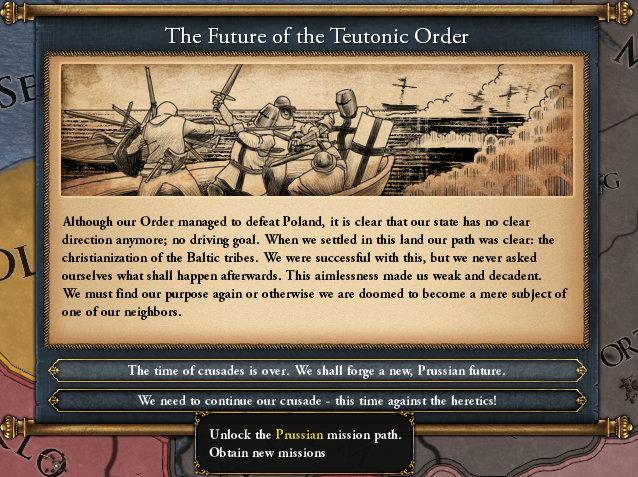

You have the choice of two rather big paths for your country. You either can choose the Prussian path, which is the more historical (as historical as it can get with a Teutonic Order repulsing their doom) choice, and the Crusader path, which will let your order become more zealous in the Catholic faith than ever before, but the idea of a Prussia or Reformation becomes alien to you.
Let us start with the Prussian one. Taking this path will change your mission tree substantially: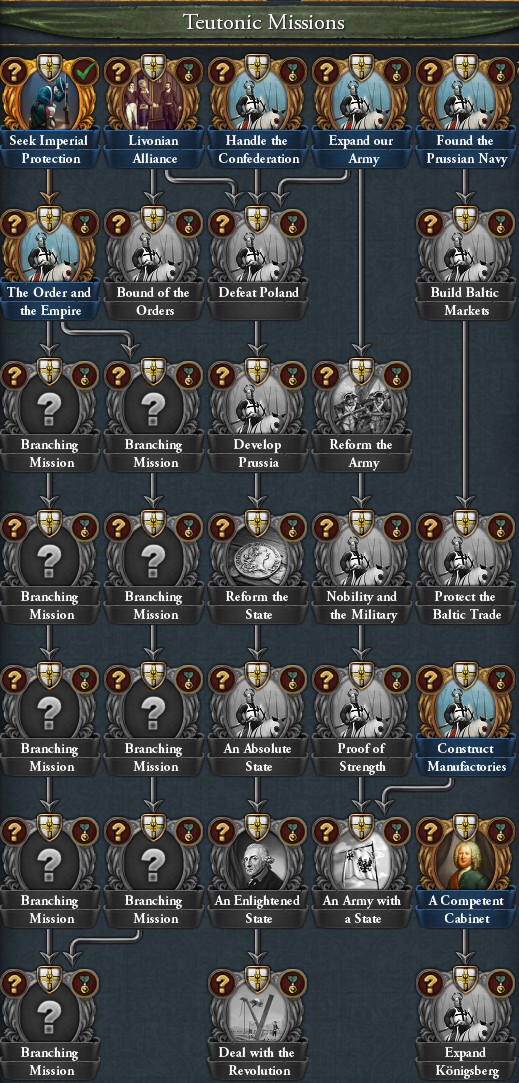
The Prussian path is mostly focusing on, well, becoming Prussia, and its role within the HRE, an improved military, Enlightenment and eventually crushing the Revolution. So if you take this path then expect to have a more long term campaign as your missions will mirror the ones of Brandenburgs Prussia.
You might notice that there are still Branching Missions left even after taking one path. These missions are your Path of Expansion basically, as your Teutonic Prussia does not need to have goals of expansion like its historical counterpart had.
Completing the mission The Order and the Empire will grant you yet another choice of what path you want to follow: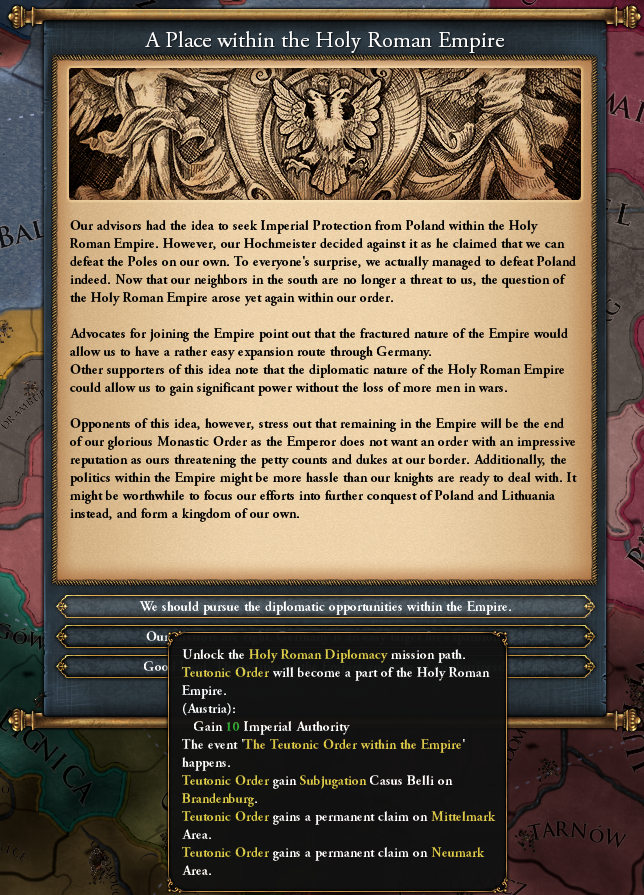

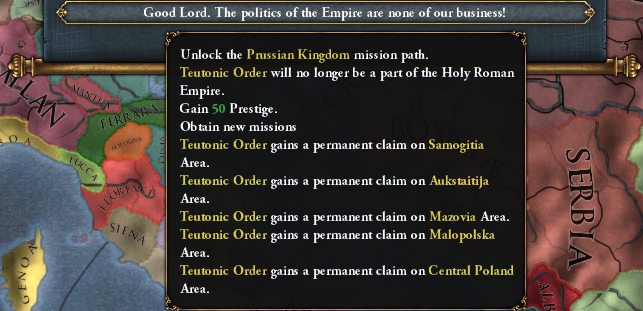
If you take either of the two HRE paths (Holy Roman Diplomacy and German Conquest) and the Emperor forbid you to declare wars on HRE members until you become Prussia, you will get the following event: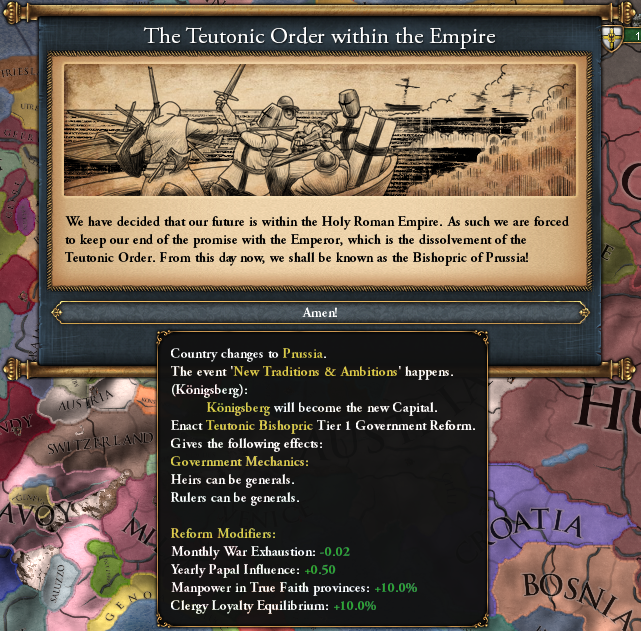
You will form a Catholic Prussia within the borders of the HRE, becoming a Teutonic Bishopric, a new government reform for a Catholic Theocratic Prussia.
Now let us go through the three different paths swiftly:
The German Conquest path has missions which are all about the pure conquest of Germany.
To be frank, there is not much to tell you about these missions as they are your classical seek and conquer missions in the HRE you are all familiar with. An Empire of Iron and Blood is, you guessed it, the final mission which basically asks you to conquer Germany. It is basically a glorified Form German Nation decision, but you get a nice +25% Governing Capacity modifier in your capital if you have one of the Prussian government reforms as your government type, at top of forming Germany (you receive this triggered province modifier as your final reward in all three of these paths).
The Holy Roman Diplomacy path is a little bit of a different story though:
Unlike the conquest missions, in the Diplomatic missions your goal is to actually become the Holy Roman Emperor yourself and unite Germany not through iron and blood, but through letters and words. In order to achieve this you will need to be elevated to a higher position than just the one of a simple bishopric. Fortunately, the mission Subjugate Brandenburg will help you with that. By vassalizing Brandenburg, you get the mission reward which enables a casus belli against the Emperor as well as three decisions, which you can use to transfer the electorship from your subject to yourself.
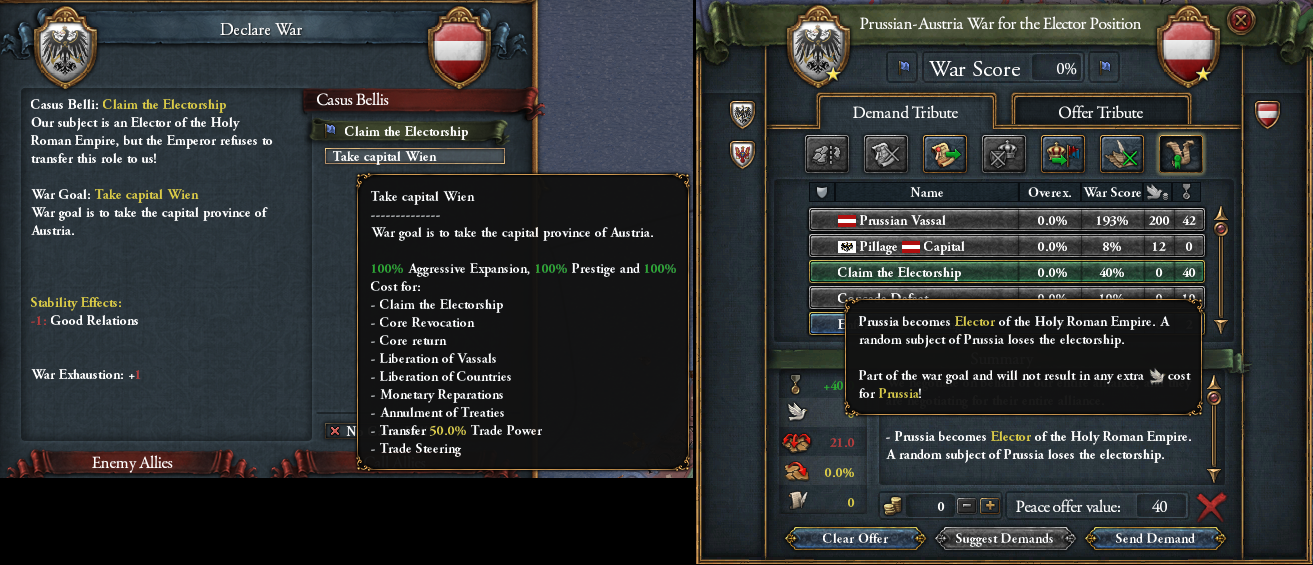
Purchasing the Electorship will require you to offer 6000 Ducats to the Emperor - while having no deficit nor loan. Requesting the Electorship will require you to be best friends with the Emperor, which means 190 opinions and 80 trust with the Emperor. The Emperor will also gain a substantial amount of favors with you, so keep this in mind. Gaining the Electorship through war is also an option as you can see in the image above. Finally, what is missing out is a decision which you can see when you become emperor and you have an elector as your subject, which allows you to usurp the Electorship, transferring it from your subject to yourself.
The mission Become an Elector will instantly elevate you to the rank of a kingdom - an Archbishopric of Prussia so to say.
Of course being an elector alone wont make you an emperor though, so eventually you have to secularize your country. If you reach level 4 of the government reforms, have 2 stability, reach tech 10 and Protestantism has spawned, you are able to complete the mission Secularize Prussia, giving the following event: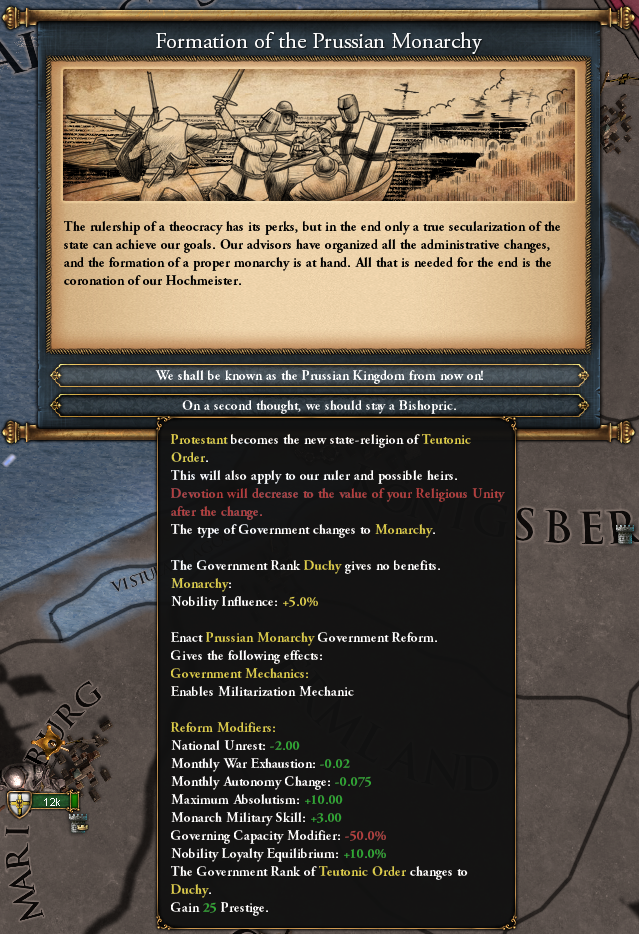
Additionally, the mission will also disable all rebels spawned from seizing land from the Clergy.
The final missions of this batch revolve around the Religious League War, becoming the Emperor of the HRE, and eventually revoking the privilege of the HRE.
But what if you dont want to deal with the HRE whatsoever? What if you always wondered what would have happened if Prussia was neither inherited by the Hohenzollern or remained a subject of the Polish-Lithuanian Commonwealth?
For that we have the final path, which is the one of the Prussian Kingdom:
These missions will set you on a conquest spree against Poland and Lithuania over and over. While they seem like another bunch of familiar conquest missions, they do have their highlights though. The mission Push into Ruthenia unlocks two unique estate privileges which stand in direct opposition to each other: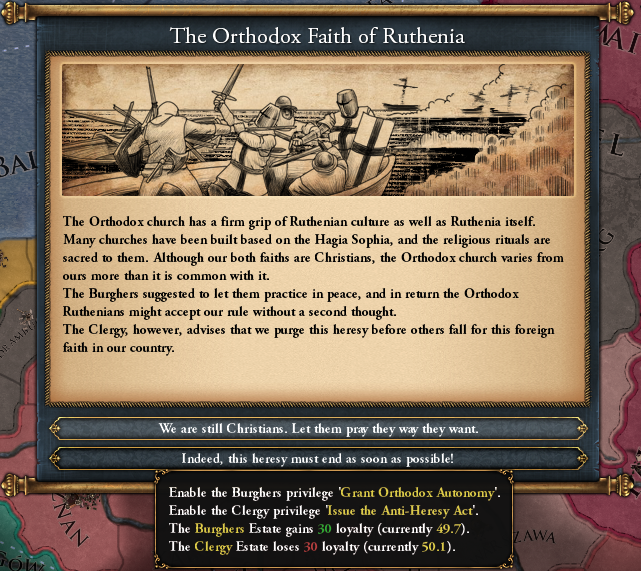
The Issue the Anti-Heresy Act is a simple Clergy privilege which increases your missionary strength against heretics by 2%, while decreasing the Burghers Loyalty Equilibrium by 10%.
The Burghers privilege Grant Orthodox Autonomy on the other hand is a little bit more intriguing.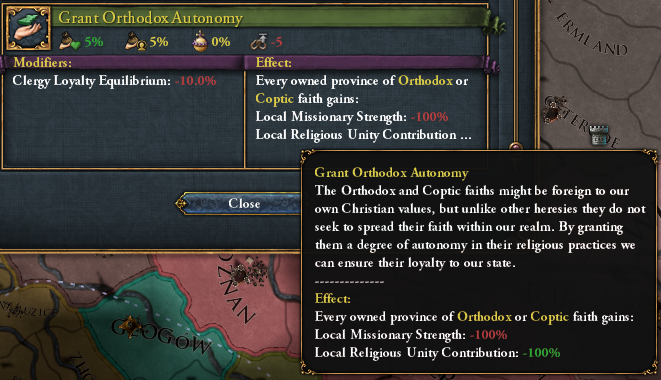
Coptic has been added here because Orthodox and Coptic faiths have this Tolerated Heresy relationship with other Christian denominations. In the context of the mission it might not make much sense, but from a gameplay perspective I think the privilege should behave the same for both.
The other highlight of this path is the Fortify the Borders and Fortify Dnieper missions which give a modifier to up to a limited number of fort buildings in the highlighted provinces, which makes the maintenance of a fort virtually non-existent.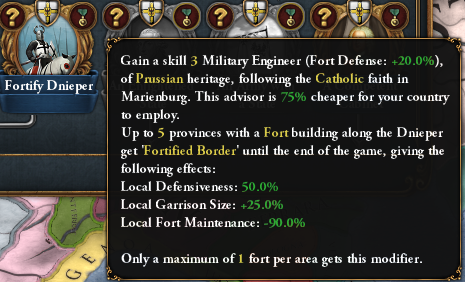
Your missions will give you claims in all of Poland, Moldavia and Ruthenia. In other words, you become the Prussian equivalent of the PLC.
But enough of Prussia for today. Let us talk about a more Catholicism orientated Teutonic Order playthrough: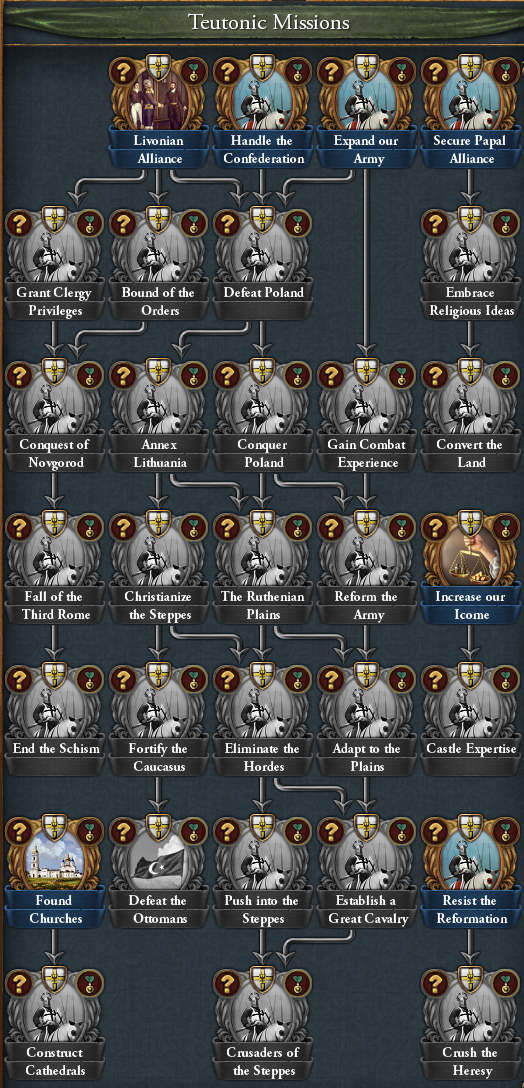
With the Crusader Path you return to your original purpose, which is Christianizing the pagans and heathens, but also to crush any kind of heresy you encounter. If you want to paint the political map with your name and the religious name in yellow, this path is perfect for you!
The most left-part of your mission tree will focus on expanding into Russia, ending the Third Rome and healing the Schism between Catholic and Orthodox faiths, though as you are not the Papal Authority but just an Order of crusading knights, your version of the Healed the Schism might be not as convincing.
The second and third columns are all about mad conquest into the east, pushing into Hordes territory and converting the steppes. The highlight here is the mission The Ruthenian Plains, which unlocks a new government reform for you!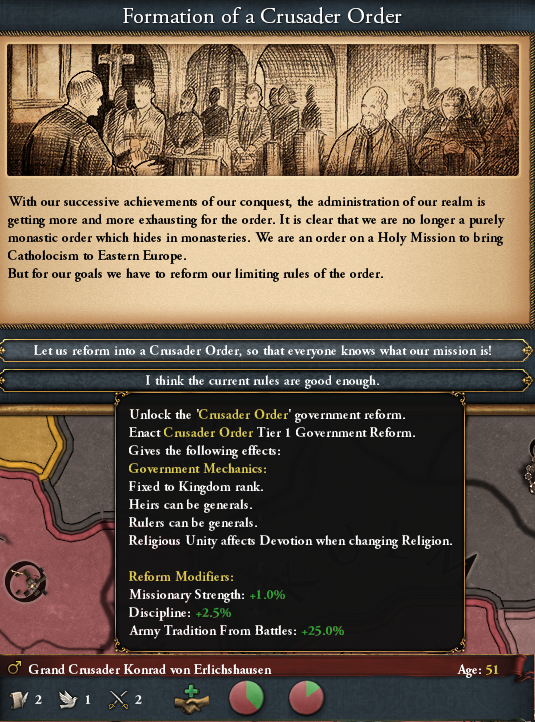
Your ruler gains a new, fancy title too!
While your Holy Order is conquering eastwards and facing more and more hordes, your fourth column of missions evolves and adapts your military to the environment of the steppes. Each military mission is about either reforming your military by achieving certain amounts of Army Professionalism (or Army Tradition), by winning battles, and later on by recruiting more cavalry units.
The military missions give a permanent modifier which makes your army more and more proficient at using cavalry. The next military mission will then replace the previous perma-modifier with a stronger one until you complete the mission Establish a Great Cavalry which gives the final version of this modifier: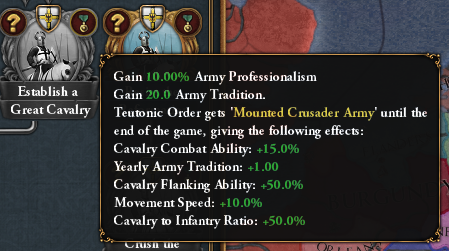
In easier terms: the more you are fighting the hordes of Central Asia and the more you crusade the steppes, the more your army becomes reliant on horses. And these military missions are basically leveling your cavalry up.
Eventually, with the mission Crusaders of the Steppes your Order will reflect the changes they did undergo through: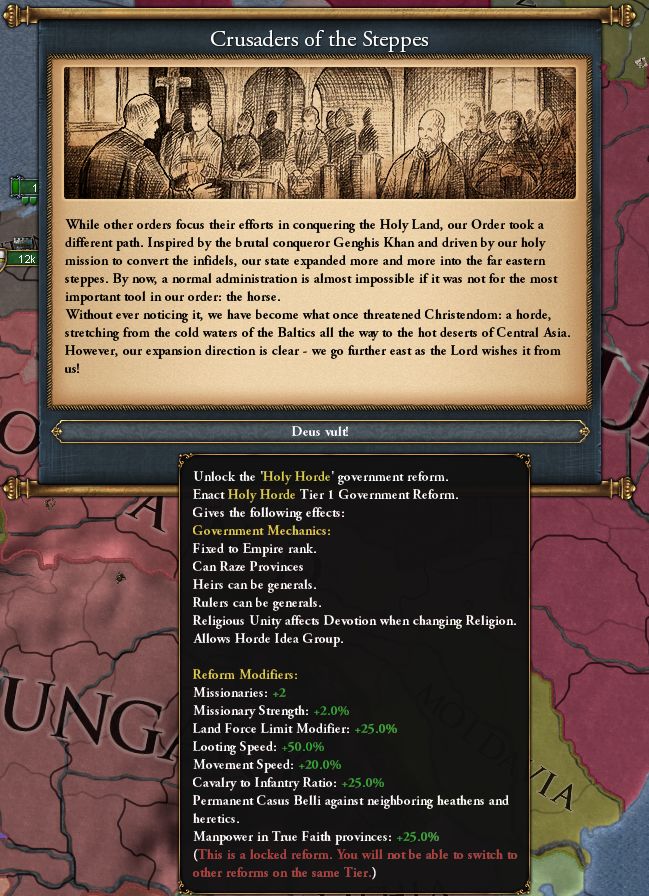
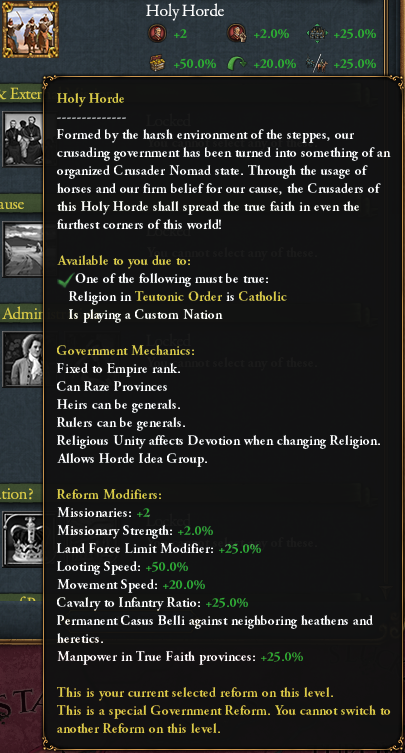
On a final note: razing works a little bit differently for a Theocratic Horde such as your Teutonic Holy Horde. You can only raze heathen and heretic provinces, and you gain 1 Devotion for each 3 development razed. Additionally, because you get this reform rather late, the decrease of the Monarch Power starts at base tech 12 instead of 3.
That was all for the Teutonic Mission Tree!
Finally a quick word for something we want to address in the Free Patch of 1.34: with the buffs of Catholicism, the religions of Protestantism, Reformed and Anglicanism have fallen off a bit in their attractiveness.
Because of that we have decided to not necessarily buff these religions, but to add more appealing options to them instead: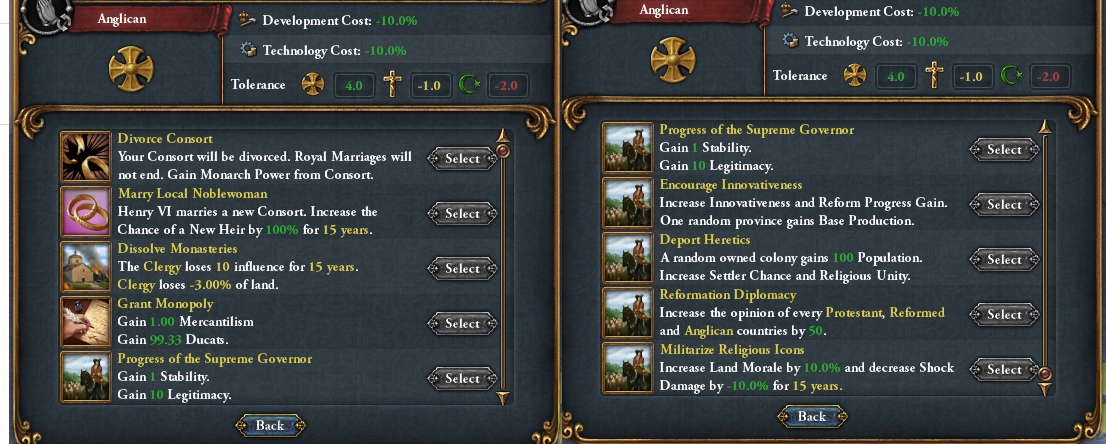
First thing: Anglicanism Aspects have been reworked. The Mercantilism and Cash actions have been combined into one. Then, Divorcing your Consort will now grant 12 ADM/DIP/MIL power per missing stat (so this means the worse your consort the more monarch power you get from divorcing, so a 6/6/6 gives 0 monarch power while a 0/0/0 would give 72 in each category). Marrying a Local Noblewoman will increase your chance of a new Heir by 100% for 15 years (you can imagine how this works). The Stability action now grants some Legitimacy (or its equivalent).
The new aspects are Encourage Innovativeness, which increases said Innovativeness Gain by 50% and Reform Progress by 15% for 15 years (hover of the aspect to read its tooltip, there you can find the values given). Then Deport Heretics is kinda self explanatory. It also increases Settler Chance by 10% and Religious Unity by 10% for 15 years. Reformation Diplomacy is a little bit of a Religious Diplomats, but for the Reformation, and Militarize Religious Icons gives some army quality. However, Militarize Religious Icons costs 200 Church Power instead of 100 like the rest.
That was it for today! Changes to Protestantism and Reformed confessions will be addressed with the next Dev Diary, as well as the content for the Livonian Order.
Until then I wish you all a nice week!
Greetings everyone!
Today I want to present to you the upcoming content for our Northern Europe Focused DLC. Yes, you heard it right, the next Immersion Pack is about the Baltic and Scandinavian countries!
Sorry to everyone who was wishing for an Atlantis DLC :p
But before I get started with it, I want to share with you what we learned from the Origins DLC and the free content alongside it, so you can get a general idea of what the design of this DLC and Patch 1.34 will be like:
- Branching missions are quite a success, and players are appreciating the flexibility of this new design. Because of that, you can expect that we continue with this philosophy for the Baltics.
- Gaining Development from buildings was an interesting experiment. Although it was not as overpowered as many players have claimed, its snowball effect is definitely not something we will continue with.
- Special units are one hell of a problem child to balance around. The Cawa units have shown that they have their niche, but they never really made it to become something of a backbone of your forces. While this is not necessarily tragic in Ethiopias case as the Cawa fulfill their role, it shows that we should dare to be more experimental with it.
- The Mali experience is probably the most polarizing one in EU4 - you either love the punches given to you by the game, or you absolutely despise the rebel spam. In all honesty, we do enjoy having tags in the game which are more painful to navigate with. With that being said, in the Baltic DLC we want to have a similar on-the-edge experience for one of our nations, but not in the form of rebel spams. How this can be achieved - and if it will be achieved in the first place - is still an open question though.
- The estate privileges and the new formables which came with the free content patch have been received very positively too - especially the Religious Diplomats. So we want to continue this trend of adding region specific content to the DLC, while more common additions - like estate privileges or government reforms - will be part of the free patch.
Speaking of the free patch: I know that there are people who do not care too much about the content of the Immersion Pack. Because of that, the end of every Mission Tree Dev Diary will also have a section addressing free content or balance changes concerning countries outside of the DLCs scopes for Patch 1.34.
With that being said, lets get started with the content reveal! But first, as usual, take into account that this content is currently under development and unpolished, so there will be placeholder art, typos, tweaked numbers, etc. before the release version.
Where some states have an army, the Prussian Army has a state. - Voltaire
Prussia was hatched from a cannon-ball. - Napoleon Bonaparte
I promise the chastity of my body, and poverty, and obedience to God, Holy Mary, and you, to the Master of the Teutonic Order, and your successors, according to the rules and practices of the Order, obedience unto death. - Oath sworn upon admission into the Teutonic Order
As you can guess, the first dev diary is about our favorite space marine nation, the Teutonic Order, and to some extent, Prussia.
Requested by Duke Conrad of Mazovia in 1225, the Teutonic Order conquered the land of the Old Prussians, converting them to Christianity while the Prussian lands got Germanized over the two centuries. As the Teutonic Order was eventually conquered and vassalized by the Poles, secularized into Prussia and inherited by the Hohenzollern, the mission tree of the Order is less about recreating history and more about the what if.
And the many question marks of their mission tree show it:

The Teutonic Mission Tree has only 6 missions you can do from the get-go, which handle the very basics of the Orders needs: gain protection from Poland, ally (and vassalize) the Livonian Order, build to force limit and of course handle the Prussian Confederation - which has become its own little disaster:

Note: the way it works is still the same as it is right now in EU4. Just the first event which gives your burghers a ton of land has been moved from a random event into one triggered by the disaster. Without the DLC you will have a decision to end the disaster, while with it the mission Handle the Confederation will finish it.
The mission Seek Imperial Protection is about joining the HRE. As you are surrounded by Poland and Lithuania, it is only natural that you want to find a way to protect yourself from these two.

The Emperor will of course receive the corresponding event to it too.

Note: The Emperor will receive this event if you join the HRE through the HRE menu instead of the event - and they can kick you out if you are on the Emperors bad side.
The Emperor will most likely choose to accept the Order in the Empire - but under the heavy restrictions that internal wars within the Empire are forbidden. Of course you can choose to reject this

A lot of guides will probably have to be rewritten now as the HRE is no longer a viable expansion path in the early game.
The mission Defeat Poland, which can be finished by either conquering 4 provinces of Poland or by defeating 3 Polish armies in battle, will unlock the rest of your mission tree.


You have the choice of two rather big paths for your country. You either can choose the Prussian path, which is the more historical (as historical as it can get with a Teutonic Order repulsing their doom) choice, and the Crusader path, which will let your order become more zealous in the Catholic faith than ever before, but the idea of a Prussia or Reformation becomes alien to you.
Let us start with the Prussian one. Taking this path will change your mission tree substantially:

The Prussian path is mostly focusing on, well, becoming Prussia, and its role within the HRE, an improved military, Enlightenment and eventually crushing the Revolution. So if you take this path then expect to have a more long term campaign as your missions will mirror the ones of Brandenburgs Prussia.
You might notice that there are still Branching Missions left even after taking one path. These missions are your Path of Expansion basically, as your Teutonic Prussia does not need to have goals of expansion like its historical counterpart had.
Completing the mission The Order and the Empire will grant you yet another choice of what path you want to follow:



If you take either of the two HRE paths (Holy Roman Diplomacy and German Conquest) and the Emperor forbid you to declare wars on HRE members until you become Prussia, you will get the following event:

You will form a Catholic Prussia within the borders of the HRE, becoming a Teutonic Bishopric, a new government reform for a Catholic Theocratic Prussia.
Now let us go through the three different paths swiftly:
The German Conquest path has missions which are all about the pure conquest of Germany.

To be frank, there is not much to tell you about these missions as they are your classical seek and conquer missions in the HRE you are all familiar with. An Empire of Iron and Blood is, you guessed it, the final mission which basically asks you to conquer Germany. It is basically a glorified Form German Nation decision, but you get a nice +25% Governing Capacity modifier in your capital if you have one of the Prussian government reforms as your government type, at top of forming Germany (you receive this triggered province modifier as your final reward in all three of these paths).
The Holy Roman Diplomacy path is a little bit of a different story though:

Unlike the conquest missions, in the Diplomatic missions your goal is to actually become the Holy Roman Emperor yourself and unite Germany not through iron and blood, but through letters and words. In order to achieve this you will need to be elevated to a higher position than just the one of a simple bishopric. Fortunately, the mission Subjugate Brandenburg will help you with that. By vassalizing Brandenburg, you get the mission reward which enables a casus belli against the Emperor as well as three decisions, which you can use to transfer the electorship from your subject to yourself.


Purchasing the Electorship will require you to offer 6000 Ducats to the Emperor - while having no deficit nor loan. Requesting the Electorship will require you to be best friends with the Emperor, which means 190 opinions and 80 trust with the Emperor. The Emperor will also gain a substantial amount of favors with you, so keep this in mind. Gaining the Electorship through war is also an option as you can see in the image above. Finally, what is missing out is a decision which you can see when you become emperor and you have an elector as your subject, which allows you to usurp the Electorship, transferring it from your subject to yourself.
The mission Become an Elector will instantly elevate you to the rank of a kingdom - an Archbishopric of Prussia so to say.
Of course being an elector alone wont make you an emperor though, so eventually you have to secularize your country. If you reach level 4 of the government reforms, have 2 stability, reach tech 10 and Protestantism has spawned, you are able to complete the mission Secularize Prussia, giving the following event:

Additionally, the mission will also disable all rebels spawned from seizing land from the Clergy.
The final missions of this batch revolve around the Religious League War, becoming the Emperor of the HRE, and eventually revoking the privilege of the HRE.
But what if you dont want to deal with the HRE whatsoever? What if you always wondered what would have happened if Prussia was neither inherited by the Hohenzollern or remained a subject of the Polish-Lithuanian Commonwealth?
For that we have the final path, which is the one of the Prussian Kingdom:

These missions will set you on a conquest spree against Poland and Lithuania over and over. While they seem like another bunch of familiar conquest missions, they do have their highlights though. The mission Push into Ruthenia unlocks two unique estate privileges which stand in direct opposition to each other:

The Issue the Anti-Heresy Act is a simple Clergy privilege which increases your missionary strength against heretics by 2%, while decreasing the Burghers Loyalty Equilibrium by 10%.
The Burghers privilege Grant Orthodox Autonomy on the other hand is a little bit more intriguing.

Coptic has been added here because Orthodox and Coptic faiths have this Tolerated Heresy relationship with other Christian denominations. In the context of the mission it might not make much sense, but from a gameplay perspective I think the privilege should behave the same for both.
The other highlight of this path is the Fortify the Borders and Fortify Dnieper missions which give a modifier to up to a limited number of fort buildings in the highlighted provinces, which makes the maintenance of a fort virtually non-existent.

Your missions will give you claims in all of Poland, Moldavia and Ruthenia. In other words, you become the Prussian equivalent of the PLC.
But enough of Prussia for today. Let us talk about a more Catholicism orientated Teutonic Order playthrough:

With the Crusader Path you return to your original purpose, which is Christianizing the pagans and heathens, but also to crush any kind of heresy you encounter. If you want to paint the political map with your name and the religious name in yellow, this path is perfect for you!
The most left-part of your mission tree will focus on expanding into Russia, ending the Third Rome and healing the Schism between Catholic and Orthodox faiths, though as you are not the Papal Authority but just an Order of crusading knights, your version of the Healed the Schism might be not as convincing.
The second and third columns are all about mad conquest into the east, pushing into Hordes territory and converting the steppes. The highlight here is the mission The Ruthenian Plains, which unlocks a new government reform for you!

Your ruler gains a new, fancy title too!
While your Holy Order is conquering eastwards and facing more and more hordes, your fourth column of missions evolves and adapts your military to the environment of the steppes. Each military mission is about either reforming your military by achieving certain amounts of Army Professionalism (or Army Tradition), by winning battles, and later on by recruiting more cavalry units.
The military missions give a permanent modifier which makes your army more and more proficient at using cavalry. The next military mission will then replace the previous perma-modifier with a stronger one until you complete the mission Establish a Great Cavalry which gives the final version of this modifier:

In easier terms: the more you are fighting the hordes of Central Asia and the more you crusade the steppes, the more your army becomes reliant on horses. And these military missions are basically leveling your cavalry up.
Eventually, with the mission Crusaders of the Steppes your Order will reflect the changes they did undergo through:


On a final note: razing works a little bit differently for a Theocratic Horde such as your Teutonic Holy Horde. You can only raze heathen and heretic provinces, and you gain 1 Devotion for each 3 development razed. Additionally, because you get this reform rather late, the decrease of the Monarch Power starts at base tech 12 instead of 3.
That was all for the Teutonic Mission Tree!
Finally a quick word for something we want to address in the Free Patch of 1.34: with the buffs of Catholicism, the religions of Protestantism, Reformed and Anglicanism have fallen off a bit in their attractiveness.
Because of that we have decided to not necessarily buff these religions, but to add more appealing options to them instead:

First thing: Anglicanism Aspects have been reworked. The Mercantilism and Cash actions have been combined into one. Then, Divorcing your Consort will now grant 12 ADM/DIP/MIL power per missing stat (so this means the worse your consort the more monarch power you get from divorcing, so a 6/6/6 gives 0 monarch power while a 0/0/0 would give 72 in each category). Marrying a Local Noblewoman will increase your chance of a new Heir by 100% for 15 years (you can imagine how this works). The Stability action now grants some Legitimacy (or its equivalent).
The new aspects are Encourage Innovativeness, which increases said Innovativeness Gain by 50% and Reform Progress by 15% for 15 years (hover of the aspect to read its tooltip, there you can find the values given). Then Deport Heretics is kinda self explanatory. It also increases Settler Chance by 10% and Religious Unity by 10% for 15 years. Reformation Diplomacy is a little bit of a Religious Diplomats, but for the Reformation, and Militarize Religious Icons gives some army quality. However, Militarize Religious Icons costs 200 Church Power instead of 100 like the rest.
That was it for today! Changes to Protestantism and Reformed confessions will be addressed with the next Dev Diary, as well as the content for the Livonian Order.
Until then I wish you all a nice week!
[ 2022-05-03 14:30:08 CET ] [Original Post]
Minimum Setup
- Processor: Intel Core i3-2105 / AMD FX 4300Memory: 4 GB RAM
- Memory: 4 GB RAM
- Graphics: Nvidia GeForce GTX 460 / AMD Radeon HD 5850Video Memory: 1 GB RAMIDIA GeForce 9600 or higher. 1024MB graphics memory requiredHard Drive:6 GB HD spaceOther Requirements:Broadband Internet connectionAdditional:GLSL 1.3. OpenGL 2.1. Controller support: 3-button mouse. keyboard and speakers. Internet Connection or LAN for multiplayer
Recommended Setup
- Processor: Intel Core i3 3240 / AMD FX 8120Memory: 8 GB RAM
- Graphics: Nvidia GeForce GTX 560 TiVideo Memory: 1 GB RAMHard Drive:6 GB HD spaceOther Requirements:Broadband Internet connectionAdditional:GLSL 1.3. OpenGL 2.1. Controller support: 3-button mouse. keyboard and speakers. Internet Connection or LAN for multiplayer
GAMEBILLET
[ 6366 ]
FANATICAL
[ 5849 ]
GAMERSGATE
[ 1587 ]
MacGameStore
[ 2438 ]
INDIEGALA
[ 469 ]
FANATICAL BUNDLES
GMG BUNDLES
HUMBLE BUNDLES
INDIEGALA BUNDLES
by buying games/dlcs from affiliate links you are supporting tuxDB

